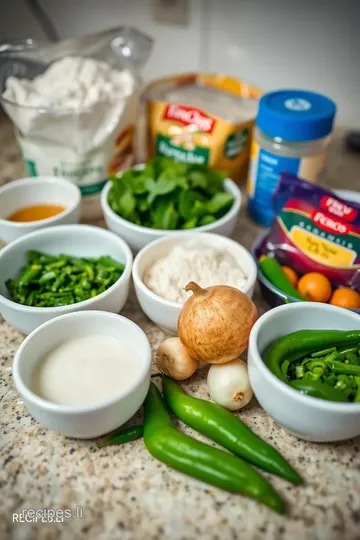Fry Bero Delicious Spinach Snack
Looking for a cozy snack? My Fry Bero Delicious Spinach Snack brings back warm memories. Try this delightful recipe for a crispy treat perfect with chai!

- Let’s Talk About Fry Bero Delicious Spinach Snack
- A Bite of History: What Are Bero?
- Why You’ll Love Them: Key Benefits
- Ready to Get Cooking? Ingredients Coming Up!
- Essential Ingredients Guide: Unlock the Secrets to Fry Bero Delicious Spinach Snack
- Mastering the Art of Cooking: The Professional Method
- Tips & Tricks for Perfecting Your Fry Bero Delicious Spinach Snack
- Recipe Card
Let’s Talk About Fry Bero Delicious Spinach Snack
Have you ever had a craving that just wouldn’t go away? i remember one particular rainy afternoon, i was curled up on my couch, flipping through old family recipes, and i stumbled upon this delightful little number: the fry bero delicious spinach snack .
Instantly, i felt that wave of nostalgia hit me. those crunchy, crispy bites were a staple in my house during tea time, and believe me, each bite is like a warm hug!
Spinach snacks like these are not just food; they’re a piece of my childhood. you ever have one of those comfort foods that just makes everything feel right in the world? yeah, this is it.
The vibe is just right. and it's so simple to whip up! but before we dive into how to make bero, let’s take a jaunt through its history and what makes it such a hit today.
A Bite of History: What Are Bero?
Bero, a traditional indian snack, traces its roots to the streets of india, where vendors serve up crispy bites that make your mouth water.
Imagine a bustling market filled with the delightful scents of spices wafting through the air. these indian fried snacks have been a favorite for generations.
They embody the essence of indian tea time snacks — something crispy and savory to enjoy between sips.
Now, fast forward to modern times. you can find these crispy vegetarian appetizers at parties, family gatherings, or just on a lazy sunday at home (like i do!).
They're not just snacks — they’re superstars all on their own. expect to spend about 50 minutes prepping and frying these little gems, and they yield a solid 12 servings if you’re prepared to share (good luck with that!).
Why You’ll Love Them: Key Benefits
Let’s chat about the perks. first off, these aren’t just delicious; they come with health benefits too! we all know the nutritional value of spinach —it’s packed with iron and other essential vitamins.
Plus, it’s low in calories, making it a guilt-free indulgence. and hey, if you’re looking for healthy snacking ideas , these are a perfect fit!
I can't stress enough: the unique blend of spices in this bero recipe is what sets it apart. garam masala, cumin, and some heat from green chilies create that addictive flavor that’ll leave you coming back for more.
Serve these with some sweet chutney, and you've got yourself a match made in foodie heaven. seriously.
And guess what? They can be made gluten-free! Just swap out the all-purpose flour for a chickpea flour alternative. You get the crunch without the gluten. Everyone’s happy, right?
I’ll let you in on a secret: these savory indian bites are perfect for snack ideas for parties too! they pair beautifully with a nice cup of chai or even a refreshing mint yogurt dip.
Who wouldn’t love that?
Ready to Get Cooking? Ingredients Coming Up!
So, are you sold on making these crispy spinach pastries? i hope so! trust me, there's nothing quite like biting into a warm, crispy bero.
Just imagine those lovely flavors dancing on your taste buds while you have friends over for some movie night or just cozying up with a good book.
Alright, in the next part, i’m breaking down what you’ll need to create this deliciousness. get ready! you’re about to make some fabulous indian fried snacks that will definitely impress everyone around you.
Let’s roll into the ingredient list and get cookin’!

Essential Ingredients Guide: Unlock the Secrets to Fry Bero Delicious Spinach Snack
Cooking can feel like a massive puzzle sometimes, right? you want everything to fit perfectly, especially when you're going for that fry bero delicious spinach snack vibe.
Let’s break it all down so you can whip these up like a pro, impress your friends, and maybe even treat yourself a little.
Premium Core Components
When you gather your ingredients, accurate measurements are a must. trust me, it makes all the difference. for your dough, you'll need 1 cup (125 g) of all-purpose flour .
It’s the backbone of your bero. got a kitchen scale? good! using it can save some headaches.
Now, fresh ingredients are key. Look for spinach that’s vibrant green —that’s your signal it’s packed with vitamins. Plus, fresh veggies bring, well, freshness. Don’t forget to wash those greens well!
As for storage? Keep any leftovers in an airtight container in the fridge. They’ll last about 3-5 days , but honestly, they probably won’t even stick around that long.
Signature Seasoning Blend
Let’s talk spice! for this bero recipe, you’ll want at least a sprinkle of garam masala and cumin seeds . these spices bring a warmth that pairs perfectly with the spinach.
And if you’re feeling adventurous, toss in some coriander or chili powder !
Herbs like cilantro or mint work great for a garnish. they brighten up that rich flavor. and don’t sleep on the aromatic chilies —they bring depth.
Wanna make it a personal twist? experiment with some dried spices like cayenne pepper for that extra kick.
Smart Substitutions
Life’s unpredictable, am i right? don’t panic if you’re missing an ingredient! for instance, if you don’t have fresh spinach , frozen works just fine; just let it thaw and squeeze out the excess water.
No one wants a soggy bero!
And for those who might be avoiding gluten, you can swap in chickpea flour (besan) or even whole wheat flour . Yep, we’re keeping it flexible here while still making something delicious!
Kitchen Equipment Essentials
Let’s not skip the tools! you don’t need a fancy setup here, just the basics. grab a mixing bowl, rolling pin, frying pan, slotted spoon , and paper towels for draining those crispy snacks.
Preparation is everything, so make sure to pour enough oil into your pan. you want it hot, around 350° f ( 175° c) .
A small piece of dough should sizzle when it hits that oil. safety first, so keep an eye on it while frying!
Tips for a Crispy Spinach Bero
Oh my gosh, the secret to that perfect crunch? don’t overcrowd the pan! frying them in small batches can lead to that golden-brown perfection we all want.
Trust me, letting them get enough oil-bath love is the way to go.
Once they’re out with that crispy crust, don’t forget to drain them on some paper towels. You’ll thank me later when you don’t have a greasy mess!
Transitioning to Bero Recipe
Now that you’ve got the lowdown on what you need—ingredients, substitutions, and tools—let’s dive into how to put it all together for that fry bero delicious spinach snack you can’t stop craving.
Ready to bring these crunchy delights to life? let’s roll up those sleeves and get cooking!
Mastering the Art of Cooking: The Professional Method
Cooking can feel like a wild ride sometimes, right? one minute, you’re dicing onions, and the next, you’re wondering if you set the oven to the right temperature.
But fear not! with a bit of professional finesse, you can cook like a pro. let’s break it down!
Essential Preparation Steps
1. mise en place:
this fancy french term means “everything in its place.” before you even think about turning on the stove, gather all your ingredients and tools.
Having everything prepped saves time and reduces stress. imagine chopping your fresh spinach for our fry bero delicious spinach snack while the oil sizzles in the pan.
Total chaos.
2. time management tips:
set aside some time where you won’t be interrupted. you wouldn’t want to start frying only to remember you left the eggs on the counter.
I like to make a little checklist for prep time and cook time. for instance, our bero recipe needs about 50 minutes in total - 20 minutes for prep, 15 minutes resting, and 15 minutes cooking .
Perfect!
3. organization strategies:
keep your workspace tidy! it’s much easier to work in a clean kitchen. use bowls or containers for each ingredient.
I’ve learned the hard way that the last-second hunt for missing spices can lead to some cooking nightmares.
4. safety considerations:
you gotta focus on safety! when using hot oil for deep frying, keep a watchful eye.
If the oil smokes, it's too hot. and always have a fire extinguisher handy. you never know when a shrimp tempura might ignite a flame!
Step-by-Step Process
Now, let’s dive into the cooking part. When you follow a recipe, like our Fry Bero , clear instructions are your best friends.
1. prepare your dough:
combine 1 cup of flour, 1/4 teaspoon turmeric, and 1/4 teaspoon salt . add water gradually and knead until it's soft.
Let it rest for 15 minutes.
2. create the filling:
in a pan, heat oil over medium heat. toss in 1 teaspoon of cumin seeds until they’re popping, then add your chopped onions and sauté until they’re translucent.
Add 2 cups of chopped spinach and let it wilt down. a sprinkle of garam masala adds that extra kick.
Sounds divine, doesn’t it?
3. assemble your bero:
roll the rested dough into circles about 3-4 inches wide. put a spoonful of your delicious filling in the center, fold, and seal! use a fork to make it look fancy if you want.
4. fry away:
heat your oil to about 350° f. when it’s hot enough, add your bero and fry until they are golden brown.
This should take about 3- 4 minutes on each side.
5. Check for Doneness:
You’ll know the Bero is ready when golden and crispy. Oh man, the smell alone will drive you wild!
Expert Techniques
Now that you’ve got the basics down, let’s level up! Here are some expert techniques to ensure your Fry Bero triumphs.
-
Professional Techniques: Keep the oil hot! If it's too cool, your Bero will turn out greasy. Nobody likes a wet snack.
-
Quality Checkpoints: Before frying, test the oil with a small piece of dough. It should bubble and sizzle ASAP if the oil’s at the right temp.
-
Troubleshooting Tips: If you run into issues, like a leak or soggy filling, remember these moments. Adjust your sealing technique or maybe even reduce the filling.
Success Strategies
Alright, let’s wrap it up with some tips for a killer Fry Bero Delicious Spinach Snack.
-
Common Mistakes to Avoid: Don’t overcrowd your frying pan! This can drop the temperature of the oil and leave you with sad, soggy snacks.
-
Quality Assurance Tips: Always taste your filling before sealing the Bero. You want it perfectly seasoned.
-
Make-Ahead Options: You can prepare the filling a day in advance. Just store it in the fridge, and you’ll save a lot of time when you’re ready to fry.
-
Serve it Right: Pair your crispy spinach pastry with some chutney for that kick. This combination is a game-changer!
And remember, cooking should be fun! So grab your apron, and let’s whip up these delicious bites that are bound to impress.
Additional Information
So there you have it! with these tips, you're on your way to making mouth-watering spinaches snacks that are sure to become a family favorite.
Whether you're throwing a party or just cooking for yourself, these savory indian bites are a must-try. now, let’s roll into the next part and explore even more stunning recipes and ideas!

Tips & Tricks for Perfecting Your Fry Bero Delicious Spinach Snack
Pro Tips & Secrets
So, you want to dive into making those fry bero delicious spinach snacks , huh? i get you—these crispy delights are a serious game-changer! here are some pro tips to whip them up like a seasoned chef.
Chef’s Personal Insights: Use fresh spinach, you guys. It makes a world of difference! The flavor just pops, and trust me, it’s worth it.
Time-saving techniques: to cut down your prep time, wash and chop your spinach and onions ahead of time. you can even roll the dough the night before.
Just store it in the fridge!
Flavor Enhancement Tips: Want to kick it up a notch? Try adding a pinch of chaat masala to your filling before sealing those Bero. It adds a tangy twist that’ll wow everyone.
Presentation Advice: Don’t just throw your Bero on a plate. Arrange them in a circle or stack them on a tiered platter for that fancy feel. It’s just more fun that way!
Perfect Presentation
Now let’s talk about making these babies look as good as they taste. You’ll want your crispy spinach pastries to shine!
Plating Techniques: Think about height and layering. If you’re serving at a party, stack Bero on a cake stand for visual wow.
Garnish Ideas: A sprinkle of chopped cilantro or a dash of chili powder adds that pop you’re looking for. Plus, they make your dish look extra inviting!
Color Combinations: Bright green spinach against golden-brown pastry? Yes, please! You can even serve with a side of vibrant red chutney to make everything visually appealing.
Visual Appeal Tips: Don’t forget to use a clean plate! A messy presentation can ruin even the best Indian fried snacks .
Storage & Make-Ahead
Sometimes life gets busy, and that’s where make-ahead options come in handy. Here’s how to store those appetizers like a pro.
Storage Guidelines: If you have leftovers (though I doubt it!), let them cool completely before storing. Use an airtight container to keep them fresh.
Preservation Methods: You can freeze un-fried Bero! Just ensure they’re separated with parchment paper so they don’t stick together.
Reheating Instructions: When you’re ready to enjoy, reheat in an air fryer or bake them in the oven. It’ll keep them crispy, unlike microwaving them.
Freshness Duration: Un-fried Bero can last for about 2-3 months in the freezer, while fried ones are best eaten within 2-3 days when stored in the fridge.
Creative Variations
Change it up! Think outside the box with these spiced spinach snacks .
Flavor Adaptations: Add in some cheese or even a spoonful of pesto for a western twist on your homemade snack recipes .
Dietary Modifications: Want to go gluten-free? You can swap out all-purpose flour with chickpea flour (besan). They’ll taste fab!
Seasonal Twists: Use seasonal ingredients like sweet potatoes or butternut squash in place of spinach. Why not?
Regional Variations: Try adapting spices from different regions of India. Adding curry leaves can bring a whole new flavor dimension to your Bero.
Complete Nutrition Guide
Let’s chat about what you’re munching on! Knowing the nutritional value of spinach is key, especially if you’re diving into healthy cooking.
Detailed Breakdown: Each serving has about 150 calories , which isn’t bad for a delicious snack!
Health Benefits: Spinach is great for you—it’s rich in vitamins A, C, and K. Plus it’s full of iron, which is essential for those energy levels.
Dietary Considerations: If you’re watching your sodium intake, you can easily adjust the salt in the filling.
Portion Guidance: Around two Bero make a perfect appetizer or tea-time snack. Pair it with your favorite chai!
Expert FAQ Solutions
You might have questions when tackling the Bero recipe . Here are some handy solutions for common queries.
Common Questions: “Can I use frozen spinach?” Absolutely! Just make sure it’s drained well to avoid sogginess.
Troubleshooting Guide: If your filling leaks while frying, it might be due to not sealing the edges properly. Double-check that crafty crimping!
Success Tips: Ensuring your oil is hot—around 350° F—before frying is crucial for crispy success. If your Bero float and bubble, you’re spot on!
Variations Explained: Feel free to swap spices! Play around with garam masala or try adding a hint of smoked paprika for depth.
Conclusion
Making fry bero delicious spinach snacks can be such a fun culinary adventure! with these tips and tricks, you’ll not only snack smart but also impress your friends and family.
So, gear up, roll up your sleeves, and make some memories in the kitchen. trust me, the crispy bites will be worth every ounce of effort!
Happy cooking, my friends!

Fry Bero Delicious Spinach Snack Card

⚖️ Ingredients:
- 1 cup all-purpose flour (125 g)
- 1/4 teaspoon turmeric powder
- 1/4 teaspoon salt
- Water (as needed for kneading)
- 2 cups fresh spinach, chopped (60 g)
- 1 medium onion, finely chopped
- 1-2 green chilies, finely chopped
- 1 teaspoon cumin seeds
- 1/2 teaspoon garam masala
- Salt to taste
- Vegetable oil (for deep frying)
🥄 Instructions:
- Step 1: In a mixing bowl, combine flour, turmeric, and salt. Gradually add water and knead until a soft dough forms. Rest for 15 minutes.
- Step 2: In a pan, heat a tablespoon of oil over medium heat. Add cumin seeds and let them splutter.
- Step 3: Add onions and sauté until translucent. Stir in spinach, green chilies, and salt. Cook until spinach is wilted.
- Step 4: Sprinkle garam masala and mix well. Remove from heat and cool.
- Step 5: Divide the dough into equal portions and roll each into a circle (about 3-4 inches in diameter).
- Step 6: Place a spoonful of filling in the center of each round. Fold over and seal the edges properly.
- Step 7: Heat oil in a frying pan over medium heat. Carefully add the filled and sealed Bero to the hot oil. Fry until golden brown and crispy on both sides.
- Step 8: Use a slotted spoon to remove and drain on paper towels.
Previous Recipe: How to Make Creamy White Gravy in 10 Minutes: A Family Favorite
Next Recipe: How to Cook Coronation Chicken: Flavorful & Quick for Picnics!
